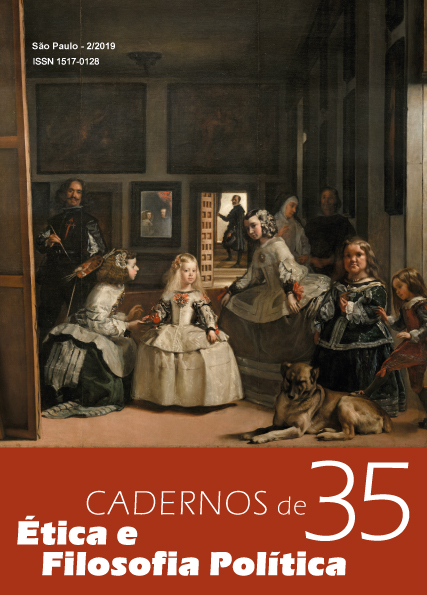Byron and Byronism in the center of modern episteme
DOI:
https://doi.org/10.11606/issn.1517-0128.v2i35p153-170Keywords:
Byron, Romanticism, Foucault, Modern episteme, SubjectivityAbstract
This paper aimed to present the identity of the so-called Byronian lyric self (whether in the work of the English poet himself or in the work of authors directly and knowingly influenced by him) with the figure of man, epicenter of the modern episteme, as presented by Foucault in his writings of the 1960s. The construction of an I whose characteristics coincide with Foucault's description of man, as notoriously presented in The Order of Things, was thus shown in The Prophecy of Dante, which served as our main analytical axis, as well as in other works in verse.
Downloads
References
AZEVEDO, A. A lira dos vinte anos. Porto Alegre: L&PM Editores, 2001.
BYRON, George Gordon. The complete works of Lord Byron: with a biographical sketch and notes. New York: Thomas Y. Crowell Company Publishers, 1927.
BYRON, George Gordon. Poemas. Tradução e organização por Péricles Eugênio da Silva Ramos. São Paulo: Hedra, 2008.
CAMPOS, H. Metalinguagem e outras metas. 4ª ed. São Paulo: Perspectiva, 2006.
CANDIDO, A. Estudo analítico do poema. 4ª ed. São Paulo: Humanitas, 2004.
CASTRO, Eduardo. Vocabulário de Foucault: um percurso pelos seus temas, conceitos e autores. 1ª edição. Belo Horizonte: Autêntica, 2009.
CHAUCIAY, R. Teoria do verso. São Paulo: Ed. McGraw-Hill, 1974.
EIKHENBAUM, B. “LiteratúrnaiaPozítsiiaLiérmontova”. In: O prózie, o poézii: sbórnik statiéi,p. 94-185. Leningrado:KhudójestvennaiaLiteratura, 1986.
FOUCAULT, Michel. Histoire de la folie à l’âge classique. Paris: Gallimard, 2011a.
FOUCAULT, Michel. História da loucura na idade clássica. Trad. José Teixeira Coelho Neto. São Paulo: Perspectiva, 2010.
FOUCAULT, Michel. « La naissance d’un monde ». In: Dits et Ecrits I 1954 – 1975, p. 814-817. Paris: Gallimard, 2011a.
FOUCAULT, Michel. « L’archéologie du savoir ». In :OEuvres (tome II), Bibliothèque de la Pléiade. Paris: Gallimard, 2015.
FOUCAULT, Michel. A arqueologia do saber. Trad. Luiz Felipe Baeta Neves. Rio de Janeiro: Forense, 2011b.
FOUCAULT, Michel. Les mots et les choses: une archéologie des sciences humaines. Paris: Gallimard, 2011c.
FOUCAULT, Michel. As palavras e as coisas: uma arqueologia das ciências humanas. Trad. Salma Tannus Muchail. São Paulo: Martins Fontes, 2007.
FOUCAULT, Michel. « L’homme est-il mort ? » In: Dits et Ecrits I 1954 –1975. Paris: Gallimard, 2001.
FOUCAULT, Michel. L’ordre du discours. Paris: Gallimard, 1971.
FOUCAULT, Michel. Sur le façon d’écrite l’histoire. In: Dits et Écrits I, 1954-1975, p. 613-628. Paris: Gallimard, 2001.
GURIÉVITCH, A. “ProbliémanrávstvennogoideálavlírikeLiérmontova”.In: TvórtchestvoM. Iu. Liérmontova: 150 lietsodniá rojdiéniia, 1814—1964. Мoscou: Naúka, 1964.
LÉRMONTOV, M. Sobrániiesotchiniéniivtchetyriokhtomakh. v. I. Moscou: KhudójestvennaiaLiteratura,
MURRAY, John. “Marino Filiero, Doge of Venice. An Historical Tragedy, in Five Acts. With Notes – The Prophecy of Dante, a Poem. By Lord Byron”. In: The British Review and London Critical Journal (Vol. XVIII). Printed for Baldwin, Cradock, and Joy. Paternoster-kow; and J. Hatchard and Son, Piccadilly. London, 1821.
PINTO, P. A. “O problema da subjetividade na lírica de M. I. Lérmontov: apontamentos para uma investigação no âmbito da História da Cultura”. In: SLOVO: Revista de estudos em Eslavística, v. 2, nº. 2.UFRJ, 2019. Disponível em: https://revistas.ufrj.br/index.php/slovo/article/view/23106/13706 .Acesso em 2019-09-10.
PONTE, L. da. “La Profezia di Dante di Lord Byron, tradotta in terza rima”. In: The Literary and Scientific Repository and Critical Review (Vol. IV, Nº 07 e 08). New York: Published Quartely, 1822.
ROWLEY, Rosemarie. Byron’s Prophecy of Dante and it’s Form, Terza Rima. Irish Byron Society. Dublin. 2011. Disponível em: http://irishbyronsociety.ie/pdfs/dantie.pdf . Acesso em 08-08-2019.
RUEFF, Martin. « Notice : L’archéologie du savoir ». In: Michel FoucaultOEuvres (tome II), Bibliothèque de la Pléiade. Paris : Gallimard, 2015.
SABOT, Philippe. Lire Les mots et les choses de Michel Foucault. Paris: PUF, 2006.
SABOT, Philippe. « Notice : Les mots et les choses ». In: Michel FoucaultOEuvres (tome I), Bibliothèque de la Pléiade. Paris: Gallimard, 2015.
SALIBA, E. As utopias românticas. 2ª ed. São Paulo: Estação Liberdade, 2003.
SAMPAIO, P. I. M. O momento marginalista: uma arqueologia do pensamento econômico do século XIX. 2019. Dissertação (Mestrado em Filosofia) - Faculdade de Filosofia, Letras e Ciências Humanas, Universidade de São Paulo, São Paulo, 2019. Disponível em: http://www.teses.usp.br/teses/disponiveis/8/8133/tde-09092019-170900/. Acesso em: 2019-09-10.
VIGNY, Alfred. Stello. Paris: Ernest Flammarion, s/d.
WACHTEL, M. Introduction to Russian Poetry. Cambridge: Cambridge University Press, 2004.
Downloads
Published
Issue
Section
License
Copyright (c) 2019 Pedro Ivan Moreira de Sampaio, Pedro Augusto Pinto

This work is licensed under a Creative Commons Attribution-ShareAlike 4.0 International License.


